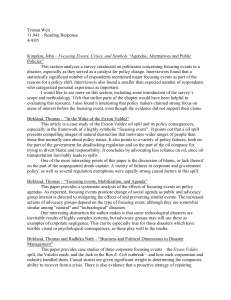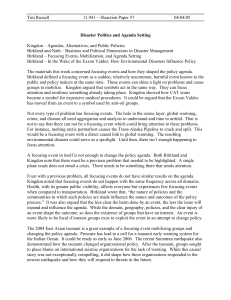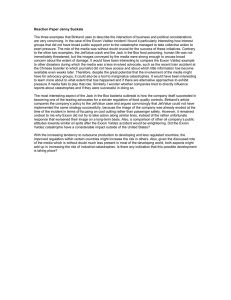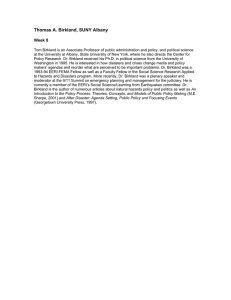11.941 Spring 2005: Disaster, Vulnerability and Resilience
advertisement
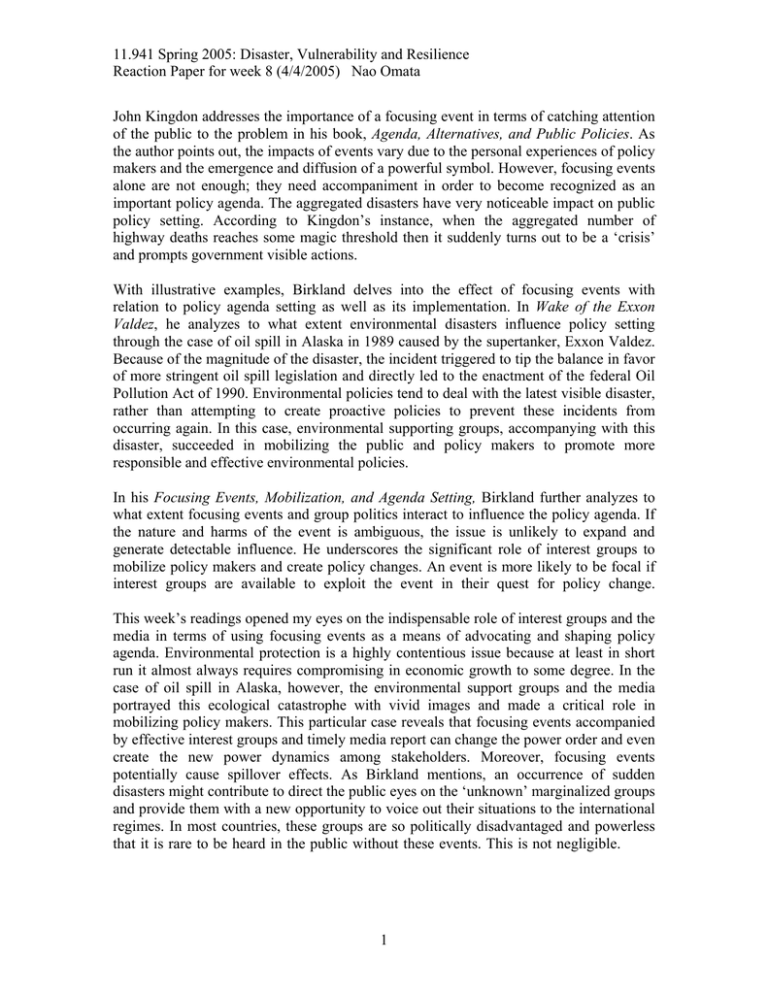
11.941 Spring 2005: Disaster, Vulnerability and Resilience Reaction Paper for week 8 (4/4/2005) Nao Omata John Kingdon addresses the importance of a focusing event in terms of catching attention of the public to the problem in his book, Agenda, Alternatives, and Public Policies. As the author points out, the impacts of events vary due to the personal experiences of policy makers and the emergence and diffusion of a powerful symbol. However, focusing events alone are not enough; they need accompaniment in order to become recognized as an important policy agenda. The aggregated disasters have very noticeable impact on public policy setting. According to Kingdon’s instance, when the aggregated number of highway deaths reaches some magic threshold then it suddenly turns out to be a ‘crisis’ and prompts government visible actions. With illustrative examples, Birkland delves into the effect of focusing events with relation to policy agenda setting as well as its implementation. In Wake of the Exxon Valdez, he analyzes to what extent environmental disasters influence policy setting through the case of oil spill in Alaska in 1989 caused by the supertanker, Exxon Valdez. Because of the magnitude of the disaster, the incident triggered to tip the balance in favor of more stringent oil spill legislation and directly led to the enactment of the federal Oil Pollution Act of 1990. Environmental policies tend to deal with the latest visible disaster, rather than attempting to create proactive policies to prevent these incidents from occurring again. In this case, environmental supporting groups, accompanying with this disaster, succeeded in mobilizing the public and policy makers to promote more responsible and effective environmental policies. In his Focusing Events, Mobilization, and Agenda Setting, Birkland further analyzes to what extent focusing events and group politics interact to influence the policy agenda. If the nature and harms of the event is ambiguous, the issue is unlikely to expand and generate detectable influence. He underscores the significant role of interest groups to mobilize policy makers and create policy changes. An event is more likely to be focal if interest groups are available to exploit the event in their quest for policy change. This week’s readings opened my eyes on the indispensable role of interest groups and the media in terms of using focusing events as a means of advocating and shaping policy agenda. Environmental protection is a highly contentious issue because at least in short run it almost always requires compromising in economic growth to some degree. In the case of oil spill in Alaska, however, the environmental support groups and the media portrayed this ecological catastrophe with vivid images and made a critical role in mobilizing policy makers. This particular case reveals that focusing events accompanied by effective interest groups and timely media report can change the power order and even create the new power dynamics among stakeholders. Moreover, focusing events potentially cause spillover effects. As Birkland mentions, an occurrence of sudden disasters might contribute to direct the public eyes on the ‘unknown’ marginalized groups and provide them with a new opportunity to voice out their situations to the international regimes. In most countries, these groups are so politically disadvantaged and powerless that it is rare to be heard in the public without these events. This is not negligible. 1
